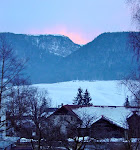On Friday night we enjoyed in the small but real theater Biel-Bienne the opera Amadis by Jean-Baptist Lully. Lully was the King's favored composer, much more appreciated and spoiled than his colleague Bach in Germany, whose music was much more complicated, less pleasant and covered a much, much wider spectrum both in rhythm, harmony and structure. Of course Amadis is about the unmatched love, about its foes, troubles and ultimate victory. A favored theme not only at the King's palace in France, but ever before and since and anywhere else.
This time in Bienne, Lully's Opera had been rearranged to incorporate some modern, jazzy parts, a little like Play-Bach, very capably performed by the soloists and the choir. Playful and funny, not without some pointed sarcasm while still being beautiful in its way to expand Lully's go-rounds whose pleasantness may get boring after a while. The performance began in a Restaurant near the theatre, where Amadi's death was being announced and the funeral initiated. Amadis is a star (sure, after having triumphed over the forces of evil, hatred and lies.
By the way, there is an interesting occurrence of wordplays about the preference of truthfulness over faithfulness, and about the saving power of continuity (Beständigkeit) - as in a variation of faithfulness, which in Hollywoodian philosophy about love has become a somewhat shallow concept.
Back to Amadis: as is usual in the community of followers, the star is being celebrated and I joked to my brother-in-law who sings in the choir, that what he would have fled by all means in the church he now did in the theatre: singing a hymn to the hero with arms swinging up in the air as in charismatic worship. - Gathered in the tiny and beautiful, intimate theatre then the life of Amadis was being performed. Just a great enjoyable and amusing few moments.
We had spent the week on the farm, out in the countryside of the Franches-Montages, where fox and rabbit say good-night to each other - literally - and where the seasons consist of six months of winter and four months of cold. What fascinates, captures, comforts and encourages me there is the calm, the peacefulness, the self-evidence of nature and its "caprices", its uneven weather. The spirit blows where it wills, and so does the wind in the Jura. You wake up in the morning and go first to the window to see how much snow there is and whether it's blowing again - or still. First you don't want to go outside, you enjoy the coziness of the fireplace, the warmth of the house, the smell of morning milk coffee, the salty-smooth taste of tête-de-moine. Then, once you're outside, it's just and plain beautiful. The comforting beauty and continuity of unpredictability in exactly what the trees will look like, and the road, and the fields. And the steadfast calm of pine trees, heavy with snow and withstanding the wind, bending over and back. A parable for life, mending in with the truth of love. Grace and beauty....



